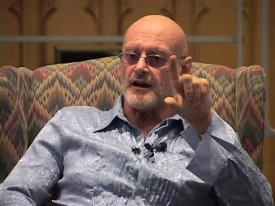
Daniel Gustav Anderson, both on his own blog (For the Turnstiles) and at Integral World, has long been a vocal critic Ken Wilber's version of integral theory, commonly known as AQAL. In this most recent installment, he deconstructs Wilber's essential premises and finds them lacking.
The article is short - more of a call-to-arms - so I'm posting all of his critique here. I encourage both fans and critics of Wilber's work to have a look at this post - I think there is some merit to Anderson's arguments.
Daniel Gustav Anderson is presently a graduate student in Cultural Studies at George Mason University. His interests include critical theory, ecology, and European and South Asian traditions of dialectical thinking. He is the author of "Of Syntheses and Surprises: Toward a Critical Integral Theory", "Such a Body We Must Create: New Theses on Integral Micropolitics" and "Sweet Science:” A Proposal for Integral Macropolitics", which have been published in Integral Review.
Towards A Post-Wilberian, Critical Integral Theory
Why It is Not Necessary to Read Past Page Five in Sex, Ecology, Spirituality
Daniel Gustav Anderson
This is the real reason why Sex, Ecology, Spirituality is taken seriously by true believers, but has not been warmly accepted by the academy.In a recent essay, "Understanding Evolution", Toby Rogers describes the cognitive dissonance of adhering earnestly to the doctrines presented in Sex, Ecology, Spirituality while engaging with conflicting evidence from the natural sciences.[1] If SES is the greatest spiritual masterpiece in the history of world civilization, as Rogers professes and as the book's final chapter seems to proclaim, then how is it possible for simple materialism to kick the tortoises out from under the Wilberian Kosmos?
This is possible because of the way Wilber structured his argument. It is structured badly. This is the real reason why SES is taken seriously by true believers, but has not been warmly accepted by the academy, not because of some “mean green meme” living in fear of True Depth. No: it is because Wilber's argument is based on faulty premises. Here is the first and most foundational example.
In SES Wilber posits that certain claims can be taken for granted across many academic disciplines, and then proposes:
if we take these types of largely-agreed-upon orienting generalizations from the various branches of knowledge (from physics to biology to psychology to theology), and if we string these orienting generalizations together, we will arrive at some astonishing and often profound conclusions, conclusions that, as extraordinary as they might be, nonetheless embody nothing more than our already-agreed-upon knowledge (5).The reader may be comforted by this promise of nothing new or challenging to one's prejudices (“already-agreed-upon”) and by the appeal to a presumed consensus as a measure of any claim's validity. Methodologically, this practice of stringing together a set of truisms may appear to contradict Wilber's polemic against the “flatland” habit of organizing all forms of knowledge into a coherent and systematic key-to-all-mythologies (428).
As it happens, the distinction Wilber makes between his own integral project and the (for him) problematic methods of Enlightenment thinkers is not methodological so much as topical—if the content of one's conceptual map is complete by Wilber's criterion of including “depth” and “height,” that is if it explicitly addresses matters spiritual, this selected object of analysis verifies (for Wilber) the validity of the method of analysis (425): it found the desired and valued thing we “knew” was out there anyway, therefore it is a good method of inquiry.
Such is Wilber's reasoning: if we accept what we already believe as true, and reject the rest of what contradicts our prejudices, then we can build a theory of Everything that represents back to us what we want to believe is true about the world.
For all that, however, Wilber's first premise is more disturbing of his argument as a whole: that certain claims may be taken for granted as true across academic disciplines, and implicitly, within them. The state of the art in any discipline is always in flux. What appears to be an equilibrium at any one time is at best temporary, as in the faddish adherence to deconstruction in the humanities in the early 1980s.
Where does “consensus” come from, what is its relationship to truth, and what happens when disciplines attempt to communicate with each other? The work of Pierre Bourdieu and Michel Foucault is informative on such questions.
The kinds of disciplinary consensus Wilber takes for granted in SES as true now appear questionable, which is a real problem for his argument because it presumes them to be true. If one of these orienting generalizations is false, then the rest of the argument must be reconsidered.
Even if all its claims are shown to be completely bogus, however, it is still possible for some to regard SES as the best book ever for any purpose, and its author a spiritual genius. This is because it is accepted as a belief system, as a body of ideology, not as critical knowledge. In practice, this is a theology and not a dialectical tradition. And that is a problem, as I have suggested before (sometimes skillfully and sometimes foolishly).
A post-Wilberian, critical integral theory is warranted. I am seeking an integral theory that self-reflexively analyzes its own premises and works dialectically. This is impossible in the conceptual frame Wilber constructs on page five of Sex, Ecology, Spirituality.
NOTES
[1] Toby Rogers Understanding Evolution: Stephen Jay Gould vs. Ken Wilber, www.integralworld.net
No comments:
Post a Comment